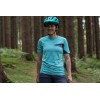The 2021-model Merida BIG.NINE 5000 is a well rounded XC bike that makes light work of longer rides, but is still capable enough to make the downhills fun. Its well-rounded spec and decent fork mean its good right out of the box, but that lightweight carbon frame means it's entirely worthy of longterm upgrades.
- The best mountain bikes you can buy for under £1,500 - full sus and hardtails
- Best mountain bikes for under £3,000 - capable trail bikes that won't break the bank
- Best mountain bikes you can buy for under £2,000
At the heart is a CF3 carbon frame with a sub-1300g claimed weight, making it a great start for a lightweight build. It has lots of features riders expect, too, including internal cable routing, internal dropper post routing and mounts for a chain catcher.
The 10.7kg weight (without pedals) is reasonable and comparable to others, and some parts – such as the seatpost and saddle – are both relatively heavy and easy to replace.
The geometry is claimed as 'modern XC,' although with a 70 degree head angle and 73.5 degree seat angle on all sizes, and 422mm reach on our medium test bike, it isn't exactly radical. On the climbs is feels light and efficient, though – even the steepest pitches feel surprisingly easy.
This is helped by the wide-ratio, 12-speed Shimano SLX drivetrain, the sort-of wide 720mm handlebars and geometry that puts you reasonably far forward for the climbs. It's easy to get weight over the wheels and improve traction.
The 12-speed SLX, 10-51 cassette and 32-tooth chainring is well suited to the BIG.NINE's use. It's tall enough that even bits of road riding aren't too slow or tiresome, yet the large, 51T cog can keep you moving on steep or technical climbs.
At this price however, many bikes feature partial or even full Shimano XT drivetrains.
The Rockshox Reba RL fork is smooth and offers enough adjustment to keep most riders happy. The lockout (with remote lever) will also appeal to those who ride a lot of road, or who race XC or marathons.
The lockout lever itself is simple and easy to knock on and off when riding, although positioning is key – we found placing it too close to the bars meant a few too many accidental unlocks.
Pointing the BIG.NINE into any serious downhill will soon have you finding its limits, but for general, typical XC the handling is enjoyable. The performance of the fork helps here, given its supportive feel. Rocky byways and rough singletrack is enough to push the bike towards its limits, and it's quite a rewarding ride.
Wheelset: good but not great
The Maxxis Ikon (2.2”) tyres are fast but reasonably grippy, and perfect for dry summer days. They're known to be reasonably durable, too, but although these are folding they're not the top spec 3R TR version, which is a shame.
The rims are tubeless ready, but it's a little disappointing they're not taped ready and there are no valves supplied. I'd also like to see a slightly wider rim than this 22.8mm ID Merida Expert CC, for a squarer, more secure tyre profile.
After what seems like months of dry weather, mud was hard to find to test the clearances, which doesn't happen all that often. But front tyre clearance is good with the squared fork arch really helping, and while there is some clear space on the rear, it isn't as open as some – a possible factor for those looking to ride year round.
Decent finishing kit
The finishing kit is all own-brand and has no major issues. The 720mm bars should be enough for the riders this is aimed at, while the Comp CC saddle is fairly rounded and well-padded. One nice touch is the removable axle key, which fits both rear and front axles; you get a cleaner look, but can still take a wheel off without searching for a tool.
Perhaps the biggest compliment you can give a brake is to not notice it, and I barely noticed the Shimano MT-500s here. The two-piston design provides all the power and control you need from the 180/160 rotor combo, with no rubbing or adjustments needed.
While it isn't designed as a pure XC race bike, the BIG.NINE could quite happily turn its hand to racing, either shorter courses or marathons but we envisage the majority of potential buyers will be riders who simply enjoy longer rides, perhaps more on natural terrain.
Unfortunately for Merida there's no shortage of competition in this niche, and that's one area the 5000 perhaps doesn't quite stack up; some other brands are a little better specced for the money. For similar money you can look at a Scott Scale 920, a carbon 29er cross-country bike with a full SRAM GX Eagle drivetrain and Fox 32 Performance fork. From another big brand, there's also the Specialized Epic to consider, it doesn't quite match up on spec but the geometry is more progressive with a slacker head angle.
In summary
But while there is no absolute standout part, however, as a package the Merida BIG.NINE 5000 delivers good performance from its carbon frame and RockShox fork, and both feel good enough to make upgrading the rest feel worthwhile.
Although this bike isn't listed on the Merida site as available in the UK, their dealers can get them in days should you order one – Merida can get any bike from the European range to the UK shops.








